
The School of Law initially opened as a department within the School of Law and Economics in 1948 soon after the end of the Second World War. It acquired its present status as an independent school offering 12 courses within a National University in 1950, following the law faculties at the National Universities of Tokyo, Kyoto, Tohoku, and Kyushu. The school is among the most prominent of its kind in Japan with an excellent reputation for its legal education and research.
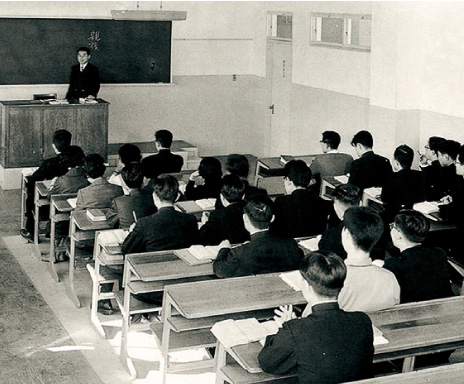
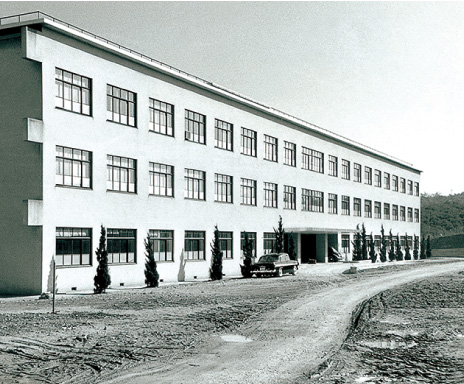
From April 1999 the School of Law adopted further curricular changes, expanding the graduate program, and placing a new emphasis on graduate studies. In practical terms, the School expanded its graduate intake and added further education options in the disciplines of law and politics; designed new opportunities to address the needs of international students, especially from countries in Asia, and set up new courses to help graduate students in the praxis of research and writing. Guest lectures given by members of the Bar Association and the business world were also set-up.
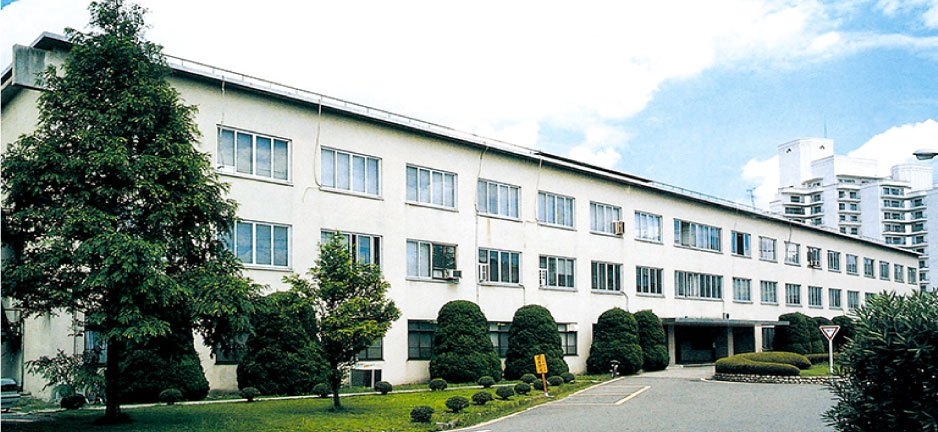
In 1999 the School of Law opened the English language-based taught LL.M. (Comparative Law) Program in Law and Political Science as part of the project for Asian technical legal assistance initiated by our school. This program, aiming at human resources development in legal fields in Asian countries, provides education and training to persons faced with the task of building institutions necessary for the transition to a market-oriented model of government and regulation, a democratic system of politics and a civil society governed by the rule of law.
In 2006, the School of Law launched an initiative for “legal education through classes taught in Japanese” which runs alongside the existing program taught in English described above.
Following the rapid development of Asian societies, in 2012, the above program has been reviewed and restructured under the concept of “Training the Next Generation of Top Asian Legal Experts: from Self-reliance to Networking.” This program aims to train a future generation of Asian leaders in law and politics and strengthen the legal professional networking among them.
In 2018, to make the network sustainable, this Program has remodeled to commence the “Program for Expanding the Asian Legal Exchange Network.” This program is offering several MEXT Scholarship seats to competent candidates, especially from Asian countries.
GSL and Center for Asian Legal Exchange (CALE) have developed the project for the “Long-term education of legal specialists proficient in Japanese” through the establishment of the Nagoya University Research and Education Center for Japanese Law (CJL) in the five overseas partner universities. In these CJLs around 20 undergraduate students enrolled in each partner university are selected and taught Japanese to reach Level 1 or 2 in the Japanese Proficiency Test by the time they graduate. CJL also offers the courses to learn Japanese law through the Japanese language. The centers are located at Tashkent State Institute of Law in Uzbekistan (2005), the National University of Mongolia School of Law (2006), Hanoi Law University, Vietnam (2007), the Royal University of Law and Economics (RULE), Cambodia (2008) and Ho Chi Minh City University of Law, Vietnam (2012). CJL aims to train continuously and systematically specialists who can understand Japanese law in Japanese.
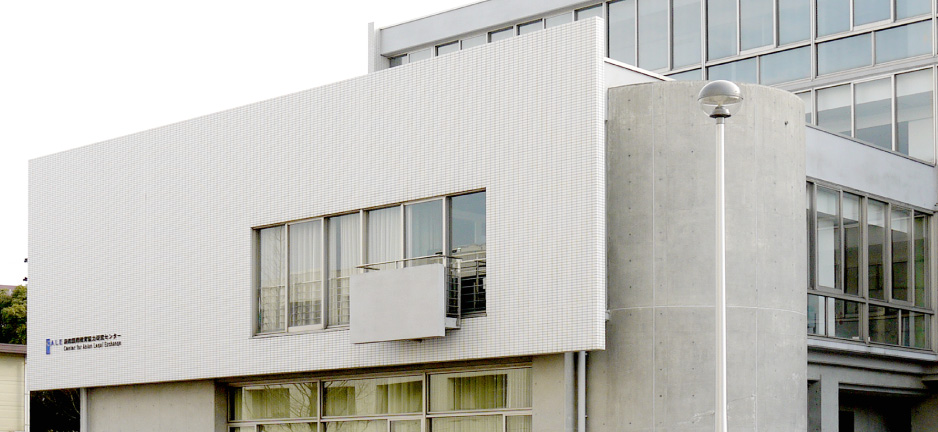
MEXT in July 2009 selected Nagoya University as one of the Core Universities for Internationalization to proceed with the Global 30 project in Japan. The Global 30 project aims to elevate the international competitiveness of Japanese education and to foster students and researchers on internationalized campuses to be active internationally. To realize the goal of the Global 30 in the field of social sciences, our School and the School of Economics have jointly taken the initiative to offer an International Social Sciences Program. The students enrolled in this program can pursue their studies entirely in English and graduate in at least four years.
To engage with globalization in the 21st Century, Japan, Korea, and China have made educating “global professionals” a shared theme, resulting in the establishment of the Campus Asia Project based on agreements reached between prestigious universities in the three countries in 2012. The project aims at educating “courageous intellectuals” with a “spirit of challenge” capable of overriding stereotyped views in the areas of law and politics. It also seeks the education of “advanced global professionals” who can operate globally through their communication abilities in foreign languages. Through the promotion of shared education at the faculties of law, economics, and humanities in universities in Japan, Korea, and China, the program aims to educate students, mainly at the undergraduate level, who can be active as future legal professionals, researchers, public officials internationally, nationally, or locally, or company people, in each of the three countries or in the wider Asian region. The participating universities exchange legal information in East Asia, together with working toward forming theories on Asian law and assistance for legal infrastructural development, as well as establishing common standards for jurist training and law school education.
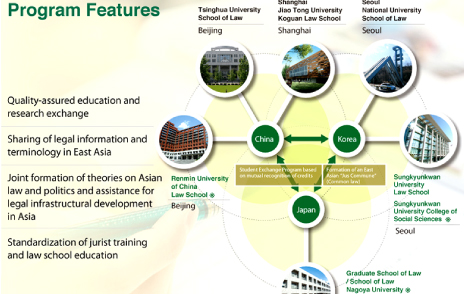
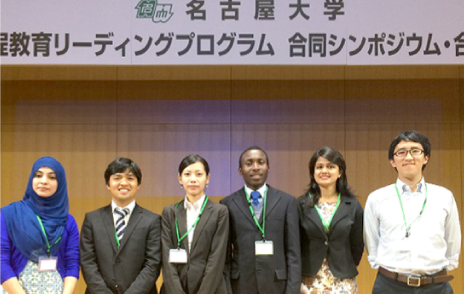
Titled the “Cross-Border Legal Institution Design” Program, the Leading Graduate School scheme initiated by MEXT (Ministry of Education, Culture, Sports, Science, and Technology) was set up at the Graduate School of Law (GSL) in 2012. The objective of the Program is to produce professionals who have a keen interest in Asia and can design institutions for cross-border transplantation. The students learn how to offer innovative, yet highly practical solutions based on flexible perspectives for understanding and comparing diverse societies, and attain knowledge and appropriate skills in organizing and managing teams of professionals from different cultures using practical communicative skills. They also develop their problem-analysis, organizational, integrated, and social management skills, and conflict resolution skills. To achieve this, the Program has created a new five-yearlong curriculum taught in English combining masters and doctorate degrees.
The Campus ASEAN Program, specifically known as the “Training a New Generation of Leaders in International Cooperation for the Development of the ASEAN Region” Program, was launched in 2012 jointly by the Graduate School of Law, the Graduate School of International Development, the School of Economics, CALE, and the International Cooperation Center for Agricultural Education (ICCAE) of Nagoya University. Nagoya University and seven overseas partner universities in Cambodia, Indonesia, the Philippines, Singapore, Thailand, and Vietnam have subsequently formed an eight-university consortium to implement this program. The universities together also develop a curriculum that combines English-medium coursework with fieldwork and internships at private enterprises, government agencies, or international organizations. Short-term and long-term exchanges of students among the eight partner universities are organized regularly to nurture the intercultural communication skills of the students.
GSL and CALE have taken the initiative to establish overseas Japan Legal Research Centers (of Nagoya University) in collaboration with the law faculties of our academic partner universities in ASEAN countries: Yangon University in Myanmar, the National University of Laos, and Gadjah Mada University in Indonesia. The Centers aim to disseminate Japanese legal information and information on the laws of the host country to act as hubs collecting and sharing legal information. A further aim is to operate as points of liaison for joint research between these partner universities and Nagoya University.
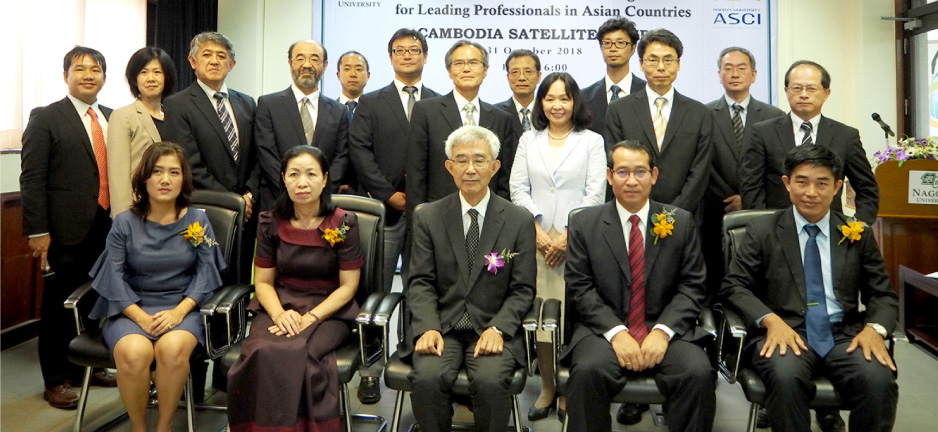
Nagoya University Graduate School of Law (GSL), through ASCI’s main office in Japan and its satellite offices in participating Asian countries, offers a special research-based doctoral program which primarily targets professionals in government positions, and academic institutions in the countries of Cambodia, Laos, Mongolia, Uzbekistan, and Vietnam. This unique program provides enrolled students with an opportunity to work towards a doctoral degree without having to suspend their career for the duration of their studies.